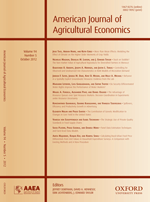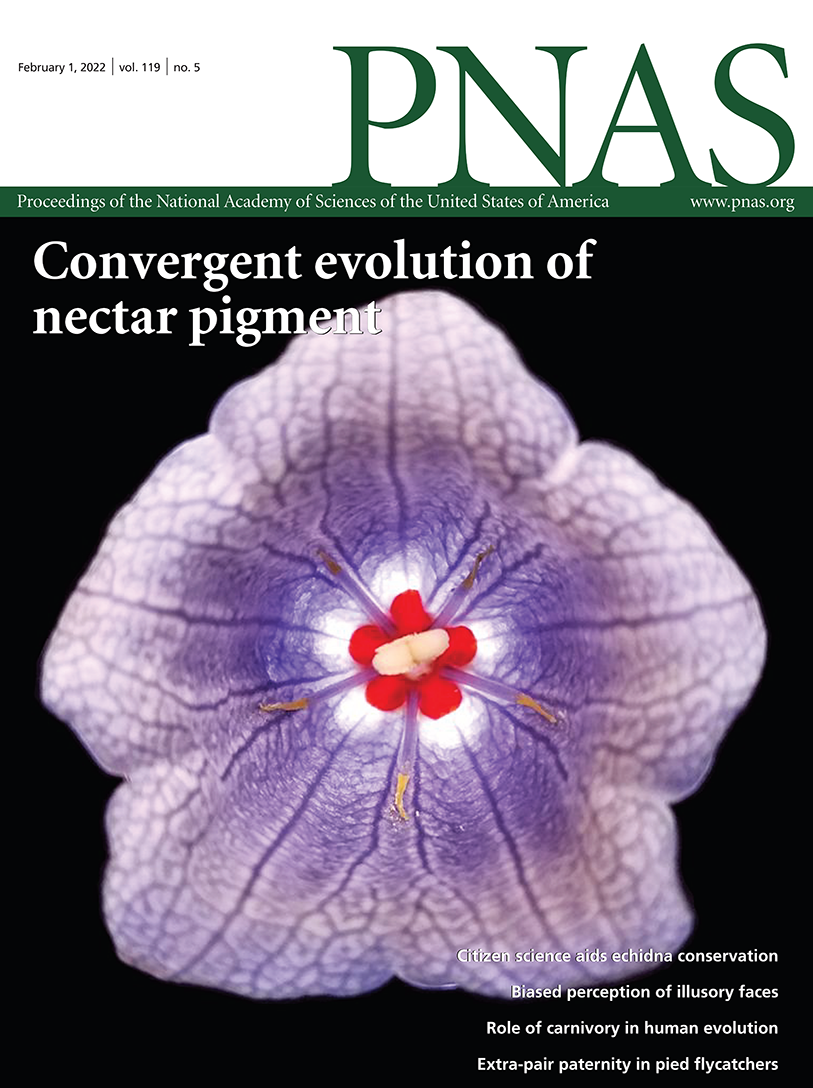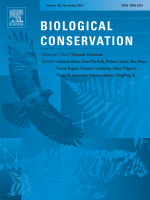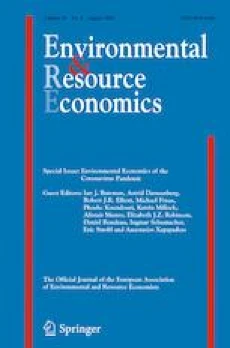publications
articles that have found a home
2024
-
 Biodiversity-food trade-offs when agricultural land is spared from productionCharles Palmer, Ben Groom, Lorenzo Sileci, and 1 more authorAmerican Journal of Agricultural Economics, Dec 2024
Biodiversity-food trade-offs when agricultural land is spared from productionCharles Palmer, Ben Groom, Lorenzo Sileci, and 1 more authorAmerican Journal of Agricultural Economics, Dec 2024The Kunming-Montreal Global Biodiversity Framework proposes to address biodiversity decline by expanding areas under conservation. Biodiversity conservation in agricultural landscapes, the world’s predominant land use, could involve sparing, or setting aside, agricultural land from production, implying biodiversity-food trade-offs. Employing bird species and agricultural data, we undertake a novel empirical analysis of such trade-offs on a set-aside scheme implemented in England between 1992-2007. Expanding set-aside increases bird species abundance and richness by, respectively, 1.2-2.1% and 0.7-0.9%, but has no impact on diversity (Shannon-Wiener index). These effects are discontinuous, subject to thresholds in set-aside areas. A minimum 3% of agricultural land set aside is required for a positive effect on biodiversity while 13% of agricultural land generates a 15-25% and 30-35% increase in abundance and richness, respectively. Estimates of short- and long-run effects show that impacts are larger in the long-run. Expanding set-aside is also associated with a 10-17% decline in cereal output, with weak evidence of an attenuating land-sparing effect on yields. Our results suggest that although biodiversity-food trade-offs are likely in high-yield agricultural landscapes, such as those in England, the risk of a reduction in food supply could be minimised in settings where there is still scope for intensification.
@article{palmer_2024, journal = {American Journal of Agricultural Economics}, title = {Biodiversity-food trade-offs when agricultural land is spared from production}, url = {http://www.lse.ac.uk/geography-and-environment/research/discussion-paper-series}, language = {eng}, urldate = {2024-06-10}, author = {Palmer, Charles and Groom, Ben and Sileci, Lorenzo and Langton, Steve}, month = dec, year = {2024}, }
2022
-
 Carbon emissions reductions from Indonesia’s moratorium on forest concessions are cost-effective yet contribute little to Paris pledgesBen Groom, Charles Palmer, and Lorenzo SileciProceedings of the National Academy of Sciences, Feb 2022
Carbon emissions reductions from Indonesia’s moratorium on forest concessions are cost-effective yet contribute little to Paris pledgesBen Groom, Charles Palmer, and Lorenzo SileciProceedings of the National Academy of Sciences, Feb 2022International initiatives for reducing carbon emissions from deforestation and forest degradation (REDD+) could make critical, cost-effective contributions to tropical countries’ nationally determined contributions (NDCs). Norway, a key donor of such initiatives, had a REDD+ partnership with Indonesia, offering results-based payments in exchange for emissions reductions calculated against a historical baseline. Central to this partnership was an area-based moratorium on new oil palm, timber, and logging concessions in primary and peatland forests. We evaluate the effectiveness of the moratorium between 2011 and 2018 by applying a matched triple difference strategy to a unique panel dataset. Treated dryland forest inside moratorium areas retained, at most, an average of 0.65% higher forest cover compared to untreated dryland forest outside the moratorium. By contrast, carbon-rich peatland forest was unaffected by the moratorium. Cumulative avoided dryland deforestation from 2011 until 2018 translates into 67.8 million to 86.9 million tons of emissions reductions, implying an effective carbon price below Norway’s US\5 per ton price. Based on Norway’s price, our estimated cumulative emissions reductions are equivalent to a payment of US\339 million to US$434.5 million. Annually, our estimates suggest a 3 to 4% contribution to Indonesia’s NDC commitment of a 29% emissions reduction by 2030. Despite the Indonesia–Norway partnership ending in 2021, reducing emissions from deforestation remains critical for meeting this commitment. Future area-based REDD+ initiatives could build on the moratorium’s outcomes by reforming its incentives and institutional arrangements, particularly in peatland forest areas.
@article{groom_carbon_2022, title = {Carbon emissions reductions from {Indonesia}’s moratorium on forest concessions are cost-effective yet contribute little to {Paris} pledges}, volume = {119}, copyright = {All rights reserved}, issn = {0027-8424, 1091-6490}, url = {https://pnas.org/doi/full/10.1073/pnas.2102613119}, doi = {10.1073/pnas.2102613119}, language = {en}, number = {5}, urldate = {2024-05-27}, journal = {Proceedings of the National Academy of Sciences}, author = {Groom, Ben and Palmer, Charles and Sileci, Lorenzo}, month = feb, year = {2022}, pages = {e2102613119}, file = {Groom et al. - 2022 - Carbon emissions reductions from Indonesia’s morat.pdf:/Users/lorenzosileci/Zotero/storage/9P28NDYS/Groom et al. - 2022 - Carbon emissions reductions from Indonesia’s morat.pdf:application/pdf} }
2021
-
 Global COVID-19 lockdown highlights humans as both threats and custodians of the environmentAmanda E. Bates, Richard B. Primack, Brandy S. Biggar, and 343 more authorsBiological Conservation, Nov 2021
Global COVID-19 lockdown highlights humans as both threats and custodians of the environmentAmanda E. Bates, Richard B. Primack, Brandy S. Biggar, and 343 more authorsBiological Conservation, Nov 2021The global lockdown to mitigate COVID-19 pandemic health risks has altered human interactions with nature. Here, we report immediate impacts of changes in human activities on wildlife and environmental threats during the early lockdown months of 2020, based on 877 qualitative reports and 332 quantitative assessments from 89 different studies. Hundreds of reports of unusual species observations from around the world suggest that animals quickly responded to the reductions in human presence. However, negative effects of lockdown on conservation also emerged, as confinement resulted in some park officials being unable to perform conservation, restoration and enforcement tasks, resulting in local increases in illegal activities such as hunting. Overall, there is a complex mixture of positive and negative effects of the pandemic lockdown on nature, all of which have the potential to lead to cascading responses which in turn impact wildlife and nature conservation. While the net effect of the lockdown will need to be assessed over years as data becomes available and persistent effects emerge, immediate responses were detected across the world. Thus, initial qualitative and quantitative data arising from this serendipitous global quasi-experimental perturbation highlights the dual role that humans play in threatening and protecting species and ecosystems. Pathways to favorably tilt this delicate balance include reducing impacts and increasing conservation effectiveness.
@article{bates_global_2021, title = {Global {COVID}-19 lockdown highlights humans as both threats and custodians of the environment}, volume = {263}, copyright = {All rights reserved}, issn = {0006-3207}, doi = {10.1016/j.biocon.2021.109175}, language = {eng}, journal = {Biological Conservation}, author = {Bates, Amanda E. and Primack, Richard B. and Biggar, Brandy S. and Bird, Tomas J. and Clinton, Mary E. and Command, Rylan J. and Richards, Cerren and Shellard, Marc and Geraldi, Nathan R. and Vergara, Valeria and Acevedo-Charry, Orlando and Colón-Piñeiro, Zuania and Ocampo, David and Ocampo-Peñuela, Natalia and Sánchez-Clavijo, Lina M. and Adamescu, Cristian M. and Cheval, Sorin and Racoviceanu, Tudor and Adams, Matthew D. and Kalisa, Egide and Kuuire, Vincent Z. and Aditya, Vikram and Anderwald, Pia and Wiesmann, Samuel and Wipf, Sonja and Badihi, Gal and Henderson, Matthew G. and Loetscher, Hanspeter and Baerenfaller, Katja and Benedetti-Cecchi, Lisandro and Bulleri, Fabio and Bertocci, Iacopo and Maggi, Elena and Rindi, Luca and Ravaglioli, Chiara and Boerder, Kristina and Bonnel, Julien and Mathias, Delphine and Archambault, Philippe and Chauvaud, Laurent and Braun, Camrin D. and Thorrold, Simon R. and Brownscombe, Jacob W. and Midwood, Jonathan D. and Boston, Christine M. and Brooks, Jill L. and Cooke, Steven J. and China, Victor and Roll, Uri and Belmaker, Jonathan and Zvuloni, Assaf and Coll, Marta and Ortega, Miquel and Connors, Brendan and Lacko, Lisa and Jayathilake, Dinusha R. M. and Costello, Mark J. and Crimmins, Theresa M. and Barnett, LoriAnne and Denny, Ellen G. and Gerst, Katharine L. and Marsh, R. L. and Posthumus, Erin E. and Rodriguez, Reilly and Rosemartin, Alyssa and Schaffer, Sara N. and Switzer, Jeff R. and Wong, Kevin and Cunningham, Susan J. and Sumasgutner, Petra and Amar, Arjun and Thomson, Robert L. and Stofberg, Miqkayla and Hofmeyr, Sally and Suri, Jessleena and Stuart-Smith, Rick D. and Day, Paul B. and Edgar, Graham J. and Cooper, Antonia T. and De Leo, Fabio Cabrera and Garner, Grant and Des Brisay, Paulson G. and Schrimpf, Michael B. and Koper, Nicola and Diamond, Michael S. and Dwyer, Ross G. and Baker, Cameron J. and Franklin, Craig E. and Efrat, Ron and Berger-Tal, Oded and Hatzofe, Ohad and Eguíluz, Víctor M. and Rodríguez, Jorge P. and Fernández-Gracia, Juan and Elustondo, David and Calatayud, Vicent and English, Philina A. and Archer, Stephanie K. and Dudas, Sarah E. and Haggarty, Dana R. and Gallagher, Austin J. and Shea, Brendan D. and Shipley, Oliver N. and Gilby, Ben L. and Ballantyne, Jasmine and Olds, Andrew D. and Henderson, Christopher J. and Schlacher, Thomas A. and Halliday, William D. and Brown, Nicholas A. W. and Woods, Mackenzie B. and Balshine, Sigal and Juanes, Francis and Rider, Mitchell J. and Albano, Patricia S. and Hammerschlag, Neil and Hays, Graeme C. and Esteban, Nicole and Pan, Yuhang and He, Guojun and Tanaka, Takanao and Hensel, Marc J. S. and Orth, Robert J. and Patrick, Christopher J. and Hentati-Sundberg, Jonas and Olsson, Olof and Hessing-Lewis, Margot L. and Higgs, Nicholas D. and Hindell, Mark A. and McMahon, Clive R. and Harcourt, Rob and Guinet, Christophe and Hirsch, Sarah E. and Perrault, Justin R. and Hoover, Shelby R. and Reilly, Jennifer D. and Hobaiter, Catherine and Gruber, Thibaud and Huveneers, Charlie and Udyawer, Vinay and Clarke, Thomas M. and Kroesen, Laura P. and Hik, David S. and Cherry, Seth G. and Del Bel Belluz, Justin A. and Jackson, Jennifer M. and Lai, Shengjie and Lamb, Clayton T. and LeClair, Gregory D. and Parmelee, Jeffrey R. and Chatfield, Matthew W. H. and Frederick, Cheryl A. and Lee, Sangdon and Park, Hyomin and Choi, Jaein and LeTourneux, Frédéric and Grandmont, Thierry and de-Broin, Frédéric Dulude and Bêty, Joël and Gauthier, Gilles and Legagneux, Pierre and Lewis, Jesse S. and Haight, Jeffrey and Liu, Zhu and Lyon, Jarod P. and Hale, Robin and D'Silva, Dallas and MacGregor-Fors, Ian and Arbeláez-Cortés, Enrique and Estela, Felipe A. and Sánchez-Sarria, Camilo E. and García-Arroyo, Michelle and Aguirre-Samboní, Giann K. and Franco Morales, Juan C. and Malamud, Shahar and Gavriel, Tal and Buba, Yehezkel and Salingré, Shira and Lazarus, Mai and Yahel, Ruthy and Ari, Yigael Ben and Miller, Eyal and Sade, Rotem and Lavian, Guy and Birman, Ziv and Gury, Manor and Baz, Harel and Baskin, Ilia and Penn, Alon and Dolev, Amit and Licht, Ogen and Karkom, Tabi and Davidzon, Sharon and Berkovitch, Avi and Yaakov, Ofer and Manenti, Raoul and Mori, Emiliano and Ficetola, Gentile Francesco and Lunghi, Enrico and March, David and Godley, Brendan J. and Martin, Cecilia and Mihaly, Steven F. and Barclay, David R. and Thomson, Dugald J. M. and Dewey, Richard and Bedard, Jeannette and Miller, Aroha and Dearden, Amber and Chapman, Jennifer and Dares, Lauren and Borden, Laura and Gibbs, Donna and Schultz, Jessica and Sergeenko, Nikita and Francis, Fiona and Weltman, Amanda and Moity, Nicolas and Ramírez-González, Jorge and Mucientes, Gonzalo and Alonso-Fernández, Alexandre and Namir, Itai and Bar-Massada, Avi and Chen, Ron and Yedvab, Shmulik and Okey, Thomas A. and Oppel, Steffen and Arkumarev, Volen and Bakari, Samuel and Dobrev, Vladimir and Saravia-Mullin, Victoria and Bounas, Anastasios and Dobrev, Dobromir and Kret, Elzbieta and Mengistu, Solomon and Pourchier, Cloé and Ruffo, Alazar and Tesfaye, Million and Wondafrash, Mengistu and Nikolov, Stoyan C. and Palmer, Charles and Sileci, Lorenzo and Rex, Patrick T. and Lowe, Christopher G. and Peters, Francesc and Pine, Matthew K. and Radford, Craig A. and Wilson, Louise and McWhinnie, Lauren and Scuderi, Alessia and Jeffs, Andrew G. and Prudic, Kathleen L. and Larrivée, Maxim and McFarland, Kent P. and Solis, Rodrigo and Hutchinson, Rebecca A. and Queiroz, Nuno and Furtado, Miguel A. and Sims, David W. and Southall, Emily and Quesada-Rodriguez, Claudio A. and Diaz-Orozco, Jessica P. and Rodgers, Ku'ulei S. and Severino, Sarah J. L. and Graham, Andrew T. and Stefanak, Matthew P. and Madin, Elizabeth M. P. and Ryan, Peter G. and Maclean, Kyle and Weideman, Eleanor A. and Şekercioğlu, Çağan H. and Kittelberger, Kyle D. and Kusak, Josip and Seminoff, Jeffrey A. and Hanna, Megan E. and Shimada, Takahiro and Meekan, Mark G. and Smith, Martin K. S. and Mokhatla, Mohlamatsane M. and Soh, Malcolm C. K. and Pang, Roanna Y. T. and Ng, Breyl X. K. and Lee, Benjamin P. Y.-H. and Loo, Adrian H. B. and Er, Kenneth B. H. and Souza, Gabriel B. G. and Stallings, Christopher D. and Curtis, Joseph S. and Faletti, Meaghan E. and Peake, Jonathan A. and Schram, Michael J. and Wall, Kara R. and Terry, Carina and Rothendler, Matt and Zipf, Lucy and Ulloa, Juan Sebastián and Hernández-Palma, Angélica and Gómez-Valencia, Bibiana and Cruz-Rodríguez, Cristian and Herrera-Varón, Yenifer and Roa, Margarita and Rodríguez-Buriticá, Susana and Ochoa-Quintero, Jose Manuel and Vardi, Reut and Vázquez, Víctor and Requena-Mesa, Christian and Warrington, Miyako H. and Taylor, Michelle E. and Woodall, Lucy C. and Stefanoudis, Paris V. and Zhang, Xiangliang and Yang, Qiang and Zukerman, Yuval and Sigal, Zehava and Ayali, Amir and Clua, Eric E. G. and Carzon, Pamela and Seguine, Clementine and Corradini, Andrea and Pedrotti, Luca and Foley, Catherine M. and Gagnon, Catherine Alexandra and Panipakoochoo, Elijah and Milanes, Celene B. and Botero, Camilo M. and Velázquez, Yunior R. and Milchakova, Nataliya A. and Morley, Simon A. and Martin, Stephanie M. and Nanni, Veronica and Otero, Tanya and Wakeling, Julia and Abarro, Sarah and Piou, Cyril and Sobral, Ana F. L. and Soto, Eulogio H. and Weigel, Emily G. and Bernal-Ibáñez, Alejandro and Gestoso, Ignacio and Cacabelos, Eva and Cagnacci, Francesca and Devassy, Reny P. and Loretto, Matthias-Claudio and Moraga, Paula and Rutz, Christian and Duarte, Carlos M.}, month = nov, year = {2021}, pmid = {34035536}, pmcid = {PMC8135229}, keywords = {Biodiversity, Global monitoring, Pandemic, Restoration}, pages = {109175}, file = {Full Text:/Users/lorenzosileci/Zotero/storage/BZJR786J/Bates et al. - 2021 - Global COVID-19 lockdown highlights humans as both.pdf:application/pdf} }
2020
-
 The Unintended Impact of Colombia’s Covid-19 Lockdown on Forest FiresMónica Amador-Jiménez, Naomi Millner, Charles Palmer, and 2 more authorsEnvironmental and Resource Economics, Aug 2020
The Unintended Impact of Colombia’s Covid-19 Lockdown on Forest FiresMónica Amador-Jiménez, Naomi Millner, Charles Palmer, and 2 more authorsEnvironmental and Resource Economics, Aug 2020The covid-19 pandemic led to rapid and large-scale government intervention in economies and societies. A common policy response to covid-19 outbreaks has been the lockdown or quarantine. Designed to slow the spread of the disease, lockdowns have unintended consequences for the environment. This article examines the impact of Colombia’s lockdown on forest fires, motivated by satellite data showing a particularly large upsurge of fires at around the time of lockdown implementation. We find that Colombia’s lockdown is associated with an increase in forest fires compared to three different counterfactuals, constructed to simulate the expected number of fires in the absence of the lockdown. To varying degrees across Colombia’s regions, the presence of armed groups is correlated with this fire upsurge. Mechanisms through which the lockdown might influence fire rates are discussed, including the mobilisation of armed groups and the reduction in the monitoring capacity of state and conservation organisations during the covid-19 outbreak. Given the fast-developing situation in Colombia, we conclude with some ideas for further research.
@article{amador-jimenez_unintended_2020, title = {The {Unintended} {Impact} of {Colombia}’s {Covid}-19 {Lockdown} on {Forest} {Fires}}, volume = {76}, copyright = {All rights reserved}, issn = {0924-6460, 1573-1502}, url = {https://link.springer.com/10.1007/s10640-020-00501-5}, doi = {10.1007/s10640-020-00501-5}, language = {en}, number = {4}, urldate = {2024-05-27}, journal = {Environmental and Resource Economics}, author = {Amador-Jiménez, Mónica and Millner, Naomi and Palmer, Charles and Pennington, R. Toby and Sileci, Lorenzo}, month = aug, year = {2020}, pages = {1081--1105}, file = {Amador-Jiménez et al. - 2020 - The Unintended Impact of Colombia’s Covid-19 Lockd.pdf:/Users/lorenzosileci/Zotero/storage/KGR24SFP/Amador-Jiménez et al. - 2020 - The Unintended Impact of Colombia’s Covid-19 Lockd.pdf:application/pdf} }